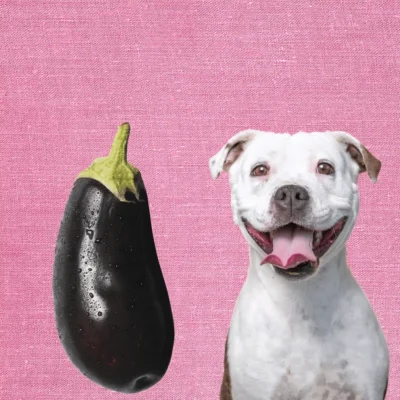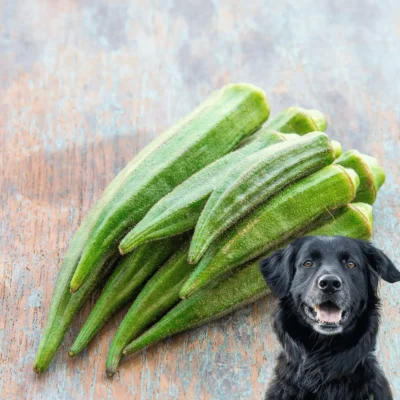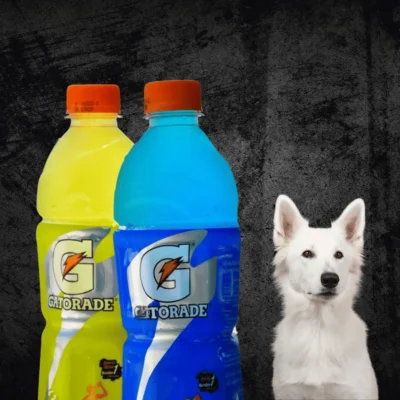As a dedicated dog owner, you always want to ensure your furry friend receives the best care and nutrition possible. With the wide range of human foods available, you might wonder if certain items, like eggplant, can be shared safely with your canine companion. Eggplant’s rich flavor and versatility in cooking may pique your interest in its suitability for dogs.
In this article, we’ll delve into the question: Can dogs eat eggplant? We’ll explore health benefits, potential risks, feeding tips, and precautions to provide you with the information necessary to make informed decisions about including eggplant in your dog’s diet.
Here are the topics we’ll discover in this blog post:
- What is an Eggplant?
- Can Dogs Eat Eggplant?
- 4 Benefits of Eggplant for Dogs
- 5 Risks of Eggplant for Dogs
- Can Dogs Develop Allergies to Eggplants?
- Tips for Safely Feeding Eggplant to Your Dog
- Before Sharing With Your Dog
What is an Eggplant?

Eggplant (Solanum melongena), also known as aubergine, is a warm-season perennial vegetable belonging to the nightshade family. It’s native to the Indian subcontinent but is now cultivated and consumed worldwide.
Eggplants typically feature smooth, glossy, deep purple skin, though variations in color, shape, and size exist. Their flesh is creamy white or yellowish with a spongy texture, containing numerous small, edible seeds.
Eggplants are commonly used in dishes such as ratatouille, moussaka, curries, stir-fries, and eggplant parmesan. They can be grilled, roasted, sautéed, or fried to bring out their rich, earthy flavor.
Can Dogs Eat Eggplant?
Yes, cooked eggplant can be given to dogs as an occasional treat. To prevent choking, it’s essential to cut the eggplant into small pieces. Additionally, ensure that the eggplant is plain, without any seasonings or added ingredients that could be harmful to your dog.
While eggplant has vitamins and antioxidants, it also contains oxalates that can affect the kidneys and solanine, which is toxic to dogs.
So, offer eggplant sparingly and watch for any bad reactions. Stick mainly to your dog’s regular food and consult your vet if you’re unsure.
4 Benefits of Eggplant for Dogs:
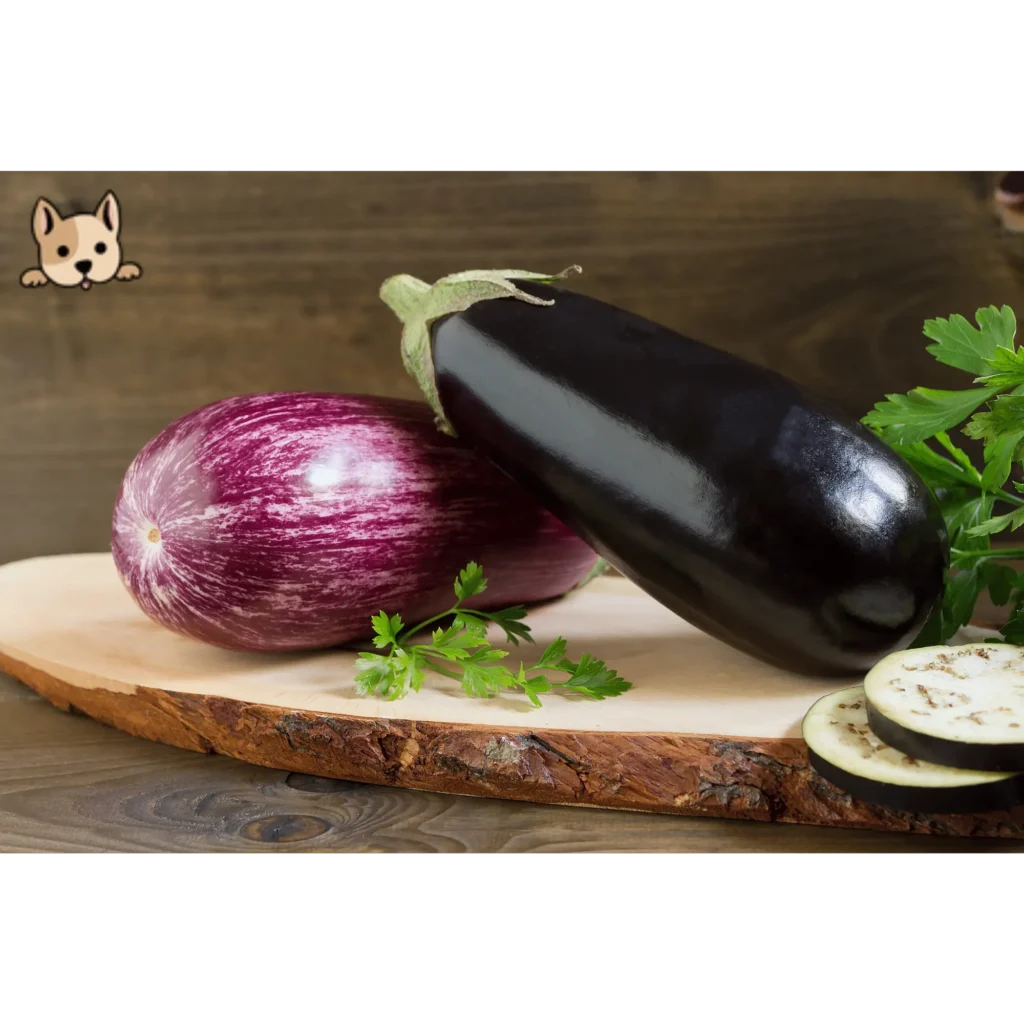
Eggplants can be a nutritious addition to your dog’s diet when fed in moderation. Here are four potential perks of including eggplant in your dog’s meals:
1. Rich in Fiber:
Fiber helps dogs feel fuller for longer periods, which can aid in weight management by reducing the urge to overeat. By incorporating eggplant into their diet, dogs can enjoy a satisfying meal without consuming excess calories.
Dietary fiber can help regulate blood sugar levels in dogs by slowing down the absorption of glucose from food. This can be beneficial for dogs with diabetes or those at risk of developing the condition.
2. Low in Calories:
Eggplant provides a satisfying and nutritious addition to a dog’s diet without significantly increasing their calorie intake. This can be beneficial for dogs needing to lose weight or maintain a healthy weight, as it allows them to enjoy a larger portion of food without exceeding their daily caloric limit.
As a low-calorie snack option, eggplant can be offered to dogs between meals to help curb hunger and prevent overeating. This is especially useful for dogs prone to begging or those with a tendency to gain weight.
3. Vitamins and Minerals:
Eggplant contains a variety of vitamins and minerals that can benefit dogs when included as part of a balanced diet. Eggplant is a good source of vitamin K, which plays a crucial role in blood clotting and bone health in dogs.
Eggplant contains vitamin B6, also known as pyridoxine, which is involved in numerous metabolic processes in dogs. Vitamin B6 supports energy metabolism, nervous system function, and the production of neurotransmitters and red blood cells.
Eggplant is a good source of potassium, an essential mineral that plays a key role in fluid balance, muscle function, and nerve transmission in dogs. Manganese is a trace mineral found in eggplant that supports bone development, wound healing, and cartilage formation in dogs.
4. Antioxidant Properties:
Antioxidants in eggplant help neutralize harmful free radicals in the body, reducing oxidative stress and protecting cells from damage. This can help prevent cellular aging and degenerative diseases in dogs, supporting overall health and longevity.
The antioxidants in eggplant, particularly chlorogenic acid, can help protect the heart and blood vessels from oxidative damage, reducing the risk of heart disease and supporting cardiovascular health.
Antioxidants play a crucial role in supporting the immune system by protecting immune cells from oxidative damage and enhancing their function.
While eggplant can offer these potential benefits, it’s essential to feed it to your dog in moderation and prepare it properly. Avoid feeding your dog eggplant cooked with seasonings, spices, or oils, as these additives can be harmful to dogs.
5 Risks of Eggplant for Dogs:

While eggplant can provide benefits to dogs when given in moderation, there are also potential risks associated with its consumption. Here are five risks of feeding eggplant to dogs:
1. Gastrointestinal Upset:
Eggplant contains solanine, a compound found in nightshade vegetables, which can be toxic to dogs in large amounts.
Consumption of eggplant, especially unripe or green parts, may lead to gastrointestinal upset, including vomiting, diarrhea, abdominal pain, and bloating.
2. Allergic Reactions:
Some dogs may be allergic to eggplant or develop sensitivities to specific proteins present in the fruit. Allergic reactions can manifest as skin itching, redness, swelling, hives, or gastrointestinal symptoms.
If you notice any signs of an allergic reaction in your dog after they consume eggplant, it’s important to stop feeding it to them immediately and consult with your veterinarian.
3. Choking Hazard:
Eggplant contains seeds and may have a firm texture, especially when raw or undercooked. Ingesting large pieces of eggplant or inadequately chewed portions may pose a choking hazard to dogs, particularly small breeds or those prone to gulping their food.
Always supervise your dog when feeding them eggplant, and ensure it is cut into small, manageable pieces.
4. Solanine Toxicity:
While the solanine levels in ripe eggplants are typically low and not considered harmful, unripe or green eggplants may contain higher concentrations of solanine, which can be toxic to dogs.
Solanine toxicity can cause gastrointestinal symptoms, lethargy, weakness, and neurological issues. It’s essential to feed only ripe, properly ripened eggplants to dogs and avoid feeding them unripe or green varieties.
5. High Oxalate Content:
Eggplant contains oxalates, naturally occurring compounds that can contribute to the formation of calcium oxalate stones in the urinary tract.
Dogs prone to urinary issues or those with a history of bladder stones should consume eggplant in moderation or under the guidance of a veterinarian to minimize the risk of stone formation.
To mitigate these risks, it’s crucial to feed eggplant to dogs in moderation, ensuring it is ripe, properly prepared, and served in small, easily digestible portions.
Can Dogs Develop Allergies to Eggplants?
Eggplant is generally considered safe for dogs, but it’s worth noting that some dogs may have allergies to it. Dogs with kidney issues or arthritis should avoid eggplant, as it may exacerbate their symptoms. If you decide to feed your dog eggplant, it’s essential to monitor them closely for any signs of an allergic reaction.
Symptoms of an Eggplant Allergy in Dogs:
- Skin itching, redness, or rash
- Swelling of the face, lips, or ears
- Hives or welts
- Gastrointestinal upsets such as vomiting or diarrhea
- Itchy or inflamed ears
- Sneezing or nasal discharge
- Difficulty breathing (in severe cases)
If you suspect that your dog is allergic to eggplant or if they exhibit any of the above symptoms after consuming eggplant, it’s essential to discontinue feeding it immediately and consult with your veterinarian. Your vet can help determine if your dog is indeed allergic to eggplant through diagnostic testing and may recommend an elimination diet or allergy testing to identify the specific allergen.
Tips for Safely Feeding Eggplant to Your Dog:
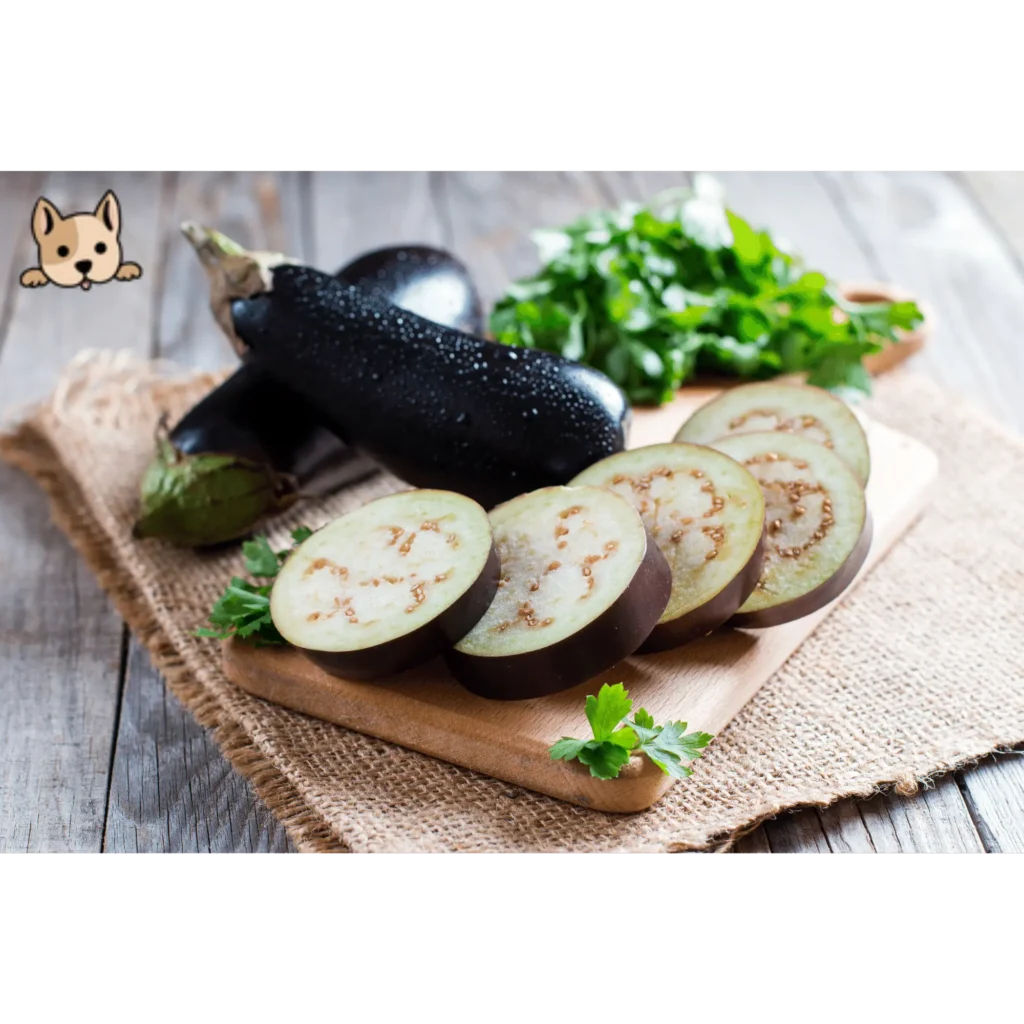
Feeding eggplant to your dog can be done safely by following these tips:
1. Remove Seeds and Skin:
Before serving eggplant to your dog, remove the seeds and peel off the skin. The seeds may pose a choking hazard, while the skin may be tough and difficult to digest. Cut the eggplant into small, bite-sized pieces to prevent choking.
2. Limit Seasonings:
Avoid adding seasonings, spices, salt, or oils to the eggplant when cooking it for your dog. These additives can be harmful to dogs and may cause digestive upset or other health issues. Stick to plain, cooked eggplant to ensure it is safe for your dog to eat.
3. Serve in Moderation:
While raw eggplant can be fed to dogs as a snack, it’s essential to chop it into small, diced pieces to prevent choking. Offer raw eggplant as an occasional treat rather than a staple in your dog’s diet.
4. Explore Different Cooking Methods:
Baking, grilling, or roasting eggplant are excellent ways to soften it and provide your dog with a warm treat. Avoid fried eggplant or dishes like eggplant Parmesan, as the breading and cheese can upset your dog’s stomach. Allow the cooked eggplant to cool before serving it to your pet.
5. Limit Oil:
When cooking eggplant, use only a small amount of olive oil to prevent stomach upset. Excessive oil consumption can lead to digestive issues and may contribute to heart disease in dogs. Keep the oil content minimal to ensure the dish is safe for your dog to eat.
By following these tips, you can safely incorporate eggplant into your dog’s diet as an occasional treat or addition to their meals. Remember to monitor your dog for any adverse reactions after eating eggplant, and consult with your veterinarian if you have any concerns or questions about feeding it to your pet.
Before Sharing With Your Dog:
Many human foods can indeed cause adverse reactions in canines, so it’s essential to consult your veterinarian to determine whether it’s safe to add these foods to your pet’s diet.
This article serves as educational and informational content and should not replace professional medical or dietary advice for your pet. Always seek guidance from your veterinarian regarding your pet’s nutritional needs and dietary requirements.
Final Thought:
In conclusion, while eggplant can offer some nutritional benefits to dogs when fed in moderation, it’s essential to proceed with caution. While it contains vitamins, minerals, and antioxidants that can support your dog’s health, it also poses risks such as solanine toxicity, oxalate content, potential choking hazards, and allergic reactions.
When feeding eggplant to your dog, always remove the seeds and skin, avoid adding seasonings or oils, serve it in moderation, and monitor your dog for any adverse reactions. Consulting with your veterinarian before introducing eggplant or any new food to your dog’s diet is crucial to ensuring their safety and well-being.
Remember, the majority of your pet’s nutritional needs should be met through their regular dog food, with treats and human food making up only a small portion of their diet. By following these guidelines and seeking professional advice when needed, you can safely incorporate eggplant into your dog’s diet as an occasional treat or addition to their meals.
FAQs:
Is cooked eggplant good for dogs?
Dogs can eat cooked eggplant in small amounts, but chop it up into small bits so they don’t choke, and don’t add any spices. Eggplants have good stuff like vitamins and antioxidants that can help keep your dog healthy.
Are eggplant plants toxic to dogs?
Before giving eggplant to your pup, be sure to remove the stems and leaves because they contain solanine, which can be toxic to dogs. However, the skin of the vegetable is safe for them to eat. Raw eggplant should be given cautiously in small pieces, as it can be a choking hazard, advises Dr. McCullough.
What if my dog accidentally ate eggplant?
A small amount of eggplant is safe for a healthy dog to eat, but those prone to kidney stones should avoid vegetables containing oxalates. Other vegetables high in oxalates include spinach, kale, beet roots, collards, and quinoa.
Which vegetables should dogs avoid eating?
Onions, leeks, and chives belong to the Allium family of plants, which are toxic to most pets, particularly cats. Consumption of onions can lead to the rupture of a dog’s red blood cells, along with symptoms like vomiting, diarrhea, stomach pain, and nausea. It’s crucial to keep these ingredients away from your pets to prevent any adverse health effects.






